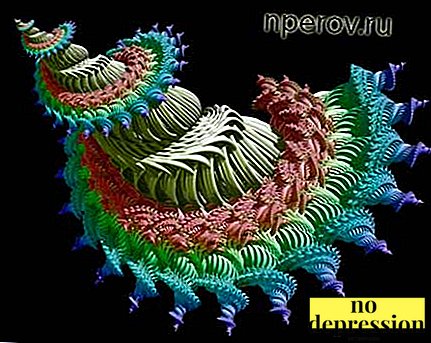When we describe a bad day, we often use the phrase "I am in a disassembled state today." Sometimes the disassembled state lasts too long to ignore it. Personal life is collapsing against the background of career achievements, and dreams of a perfect body lead away from communication with the real world. Life is a bright puzzle. Fold it completely, it means to achieve the integrity of your own "I". Sometimes it takes a long time and painstakingly to manually grind the details, but this is the only way to know yourself.
What is the integrity of the person
Personality integrity is an internal balance that manifests itself in what a person says, thinks, does, and feels in one direction. Integrity - rather, not the result, it is a process. It includes upbringing, personal life, growth in the profession, social circle, dreams and goals. All of these components - the blades on the propeller of the aircraft.
It is necessary to break one, as life begins to write incomprehensible turns. Accident does not happen, but the plane loses altitude, goes into standby mode or goes to the alternate aerodrome altogether. It is important to track down the moment of the fall and figure out how to fix your life. Do not start another, do not break yourself, do not look for the mythical missing half. Become one with yourself.
When you think about self, eyes past the will begin to snatch the names of useful articles. Many begin with the words "how to get rid of" or "how to avoid." Yeah, the reader thinks, it means that I have something extra and need to cut it off as superfluous. But they immediately come across such that they begin with the words: "how to find your soul mate" or "how to get." The reader is perplexed: That is, I already have something missing there? So sculpt or cut? It is worth doing something, and more, but with a sense of awareness.
Awareness today has become not just a popular topic, but also a meeting place. Why does it affect our personality so much? Awareness helps in every moment of life to answer the question: who am I? where am I going? how and why am I going? It is especially useful to look for answers in moments when an internal imbalance is felt. After all, it is he who leads to the loss of integrity. Practice helps to gain awareness.
Listen to your body to love yourself
Thin hair, short legs, small eyes - we savor a list of the shortcomings of our body, forgetting how much we owe to it. The degree of dissatisfaction with his own body is directly related to the feeling of happiness and self-esteem. The appeal to “love yourself” first of all concerns corporality. Maybe enough to criticize your body and start taking care of it. Here are some tips:
- Stand in front of the mirror, say out loud what you are taking in yourself. Speak of thanks to every line of your body.
- Think that in your body grieves you. It is difficult to say out loud, and sometimes just unbearable. Then write yourself a letter. In the letter, express dissatisfaction with the imperfect parts of the body, then thank them for the service, make a compliment.
- Listen to the signals that your body sends you. Runny nose, aching joints - often emotional problems are manifested by painful sensations in the body. By tracking headaches, you can sort out the hidden feelings. Even permanent injuries do not just happen, they require a thorough internal investigation.
Recognize the right to "uncomfortable" emotions
Kindness is good. Anger is bad. We are taught from childhood to divide feelings and emotions into good or bad, decent or shameful. We cannot but experience feelings, but we are ashamed of their manifestation, we do not even admit this to ourselves. We are afraid of losing control over ourselves, experiencing what others will say, fearing a reciprocal manifestation of emotions. The incomplete list of feelings consists of 150 items. How much can you call offhand? And how much do you allow yourself to assign? Write your own list without division into good or bad emotions. Think remotely about each of the points to remember: it is feelings that make us alive.
Understand what's really important
For years we have been looking for motivation, waiting for insight, or looking forward to a magical kick. We go to trainings in the hope that the presenter will share a revelation that will turn our lives 180 degrees. And only after that we will go to make what we dream. We complain about the lack of talent, trying to find a real vocation. In fact, we are doing what is important to us.
If we have been digging in for years in search of children's addictions, working on the unloved work, it means that it is important for us to just dig in ourselves. We set a goal to go to the gym and do not go there, which means that it is important for us to set goals without end. The concept of "important" is directly related to life priorities. Before drawing a new scale of priorities, sort out how they are arranged now. Talk to yourself frankly. Where you are now will be the starting point for achieving a holistic personality.
Agree with your fears
We used to think that only small children are afraid. But fears grow with us. The fear of being abandoned, misunderstood or rejected, the fear of new relationships or their breaking, the fear of aging and the greatest fear of a person is the fear of death. They shackle, interfere with life, sometimes lead to constant anxiety or panic attacks. Fears have a clear purpose - to protect us from danger. Imaginary or real, although often the danger we invent ourselves. Fear does not need to fight, you can agree with him.
One way is to imagine that the worst has already happened. Draw yourself the darkest picture of what happened with all the ensuing consequences. This picture will help you understand that you are much stronger than you yourself seem. And different relaxation techniques will be prompted by psychotherapists.
Deal with your own brakes
The integrity of the individual is beyond doubt. But external conditions change, which means that the components of your own “I” need to be able to adjust to the new conditions of life. Without inner flexibility, a person divides the world only into white and black, calling it fate. She turns to face him - everything is beautiful, the world is good, and the soul is filled with butterflies. But when fate is wrapped differently, everything collapses without a chance to improve the situation. Flexibility helps to eliminate the main brake on the path to achieving integrity - our own habits that make it difficult to live.
What does it mean to gain integrity? Agree with yourself and drop all that is not yours. It's like Michelangelo when creating sculptures from the boulder: "discard all unnecessary." Someone cut is easy, someone with great difficulty. Especially when the "not mine" is in no hurry to cut off. Make it worth it at least in order to understand: to be yourself is a fascinating activity.
What is the self-concept
The self-concept is our self-image, which is laid in childhood and formed throughout life. At an early age, it is more dependent on external factors: the assessment of parents, teachers, peers. In adulthood, the concept relies more on its own ideas. Self-concept is not related to social status, appearance or achievements. This is a simple statement of fact: "I am, I have the right to be."
Psychology defines self-concept as a three-component concept:
- beliefs of the person himself;
- assessment and self-esteem;
- his behavior.
I-concept is often transmitted on a subconscious level. It is rarely manifested only in words, but it is clearly monitored in actions, habits, behavior, voice intonation, and even in gait. This is a personal filter through which a person perceives the world around. Although events and the environment are neutral in themselves, a person finds everything in them that corresponds to his ideas.
Filtering your own "I" colors neutral events with emotions, gives meaning, gives positive or negative characteristics. And if the difference between the idea of self does not coincide with reality, it is manifested by fears, anxiety, dissatisfaction with oneself or low self-esteem.
A man with a strong self-concept able to independently plan their lives. A weak concept is also called a nursery, but it sometimes appears throughout life. People with an immature understanding of their own "I" are too dependent on the opinions of others, they do not know how to make decisions, are suggestible and constantly need someone else's approval. They do not know how to build their own borders or reckon with others.
If external support is removed from their lives, their own world will collapse. After all, he has nothing to rely on. I-concept as a definition of a person’s personality was introduced by Sigmund Freud, but it is also popular in other variations. Nietzsche, Carl Jung and Abraham Maslow wrote about it.
Children's ideas about their own "I" - this is not a sentence. If she is interested in psychologists, it means that there are already lucky people who have coped with this problem.
How to repair my self-concept
Perhaps someone has already found the answer to this question, but this is his own answer. Your answer is to find out for yourself and for yourself your own way of building life. Life offers an amazing variety of types of self-knowledge and finding meaning. Although we feel less and less what happiness it is - just to live. We give joy a purely utilitarian character, putting meaning only in what brings pleasure. But you just have to go through something great or create something useful in order to increase your own self-esteem or repair the self-concept.
Sometimes you want to whack an ax, break everything and start collecting new life. But to get a new reality from the old fragments is impossible. Integrity, self-concept, self-esteem - it all lives in my head. Instead of pining for a life in which you are not, stoti to try to write your book of life. Perhaps it will seem so exciting that it will take place on someone's shelf.



